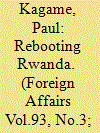|
|
|
Sort Order |
|
|
|
Items / Page
|
|
|
|
|
|
|
| Srl | Item |
| 1 |
ID:
175417


|
|
|
|
|
| Summary/Abstract |
In the study of African Politics, the analysis of political ideologies as a normative engine of political action seems to have receded in favour of a treatment of ideology as the support of actors in their pursuit of material interests. Rwanda is not an exception. The ideology of the ruling Rwandan Patriotic Front (RPF) has been predominantly analysed as a self-serving strategy geared towards the reinforcement of the party’s power. Such treatment of ideology prevents a full understanding of the RPF. This article argues that ideology should also be conceptualized as a matrix that can reshape material incentives and through which the RPF’s interests have emerged. To do so, the article analyses new sources of material, the songs of mobilization from RPF members and supporters composed before the Front took power during the genocide, to systematically delineate the RPF’s early ideology. The analysis centres on four main themes—Rwandan national unity, the RPF’s depiction of itself, its depiction of its enemy, and its relationship with the international community—and traces their influence on RPF interests in the post-genocide era. It reveals the surprisingly long-lasting power of ideas despite fast-changing material circumstances.
|
|
|
|
|
|
|
|
|
|
|
|
|
|
|
|
| 2 |
ID:
130466


|
|
|
|
|
| Publication |
2014.
|
| Summary/Abstract |
On April 6, 1994, a plane carrying Rwandan President Juvénal Habyarimana was shot down by unidentified assailants. The next day, the killings began. Over the next three months, as the international community stood by, an estimated one million Rwandans-Tutsis and moderate Hutus-were systematically slaughtered by Hutu extremists, mostly using clubs and machetes. The genocide, one of history's worst and certainly its quickest, finally ended in July, when the Rwandan Patriotic Front seized control of the country. The rebel army was led by a 36-year-old Tutsi former refugee named Paul Kagame, who promptly took political control: serving first as the de facto leader of the country while defense minister and vice president and then, in 2000, assuming the presidency. During Kagame's two-decade rule, Rwanda has made spectacular progress. A country famously deemed "nonviable" in the mid-1990s has become one of Africa's best-run, most orderly, least corrupt, and safest states, with a booming economy (Rwanda's GDP has grown by an average of eight percent in recent years). But Rwanda's success has come with a darker side: opposition politicians have been jailed or killed under mysterious circumstances, journalists complain of harassment, and Kigali has been regularly criticized for meddling in neighboring Congo's long-running civil war. In late February, Kagame met with Foreign Affairs managing editor Jonathan Tepperman in Kigali to discuss these controversies, his tenure, Rwanda today, and the legacy of the mass killings two decades ago.
|
|
|
|
|
|
|
|
|
|
|
|
|
|
|
|
| 3 |
ID:
106538


|
|
|
|
|
|
|
|